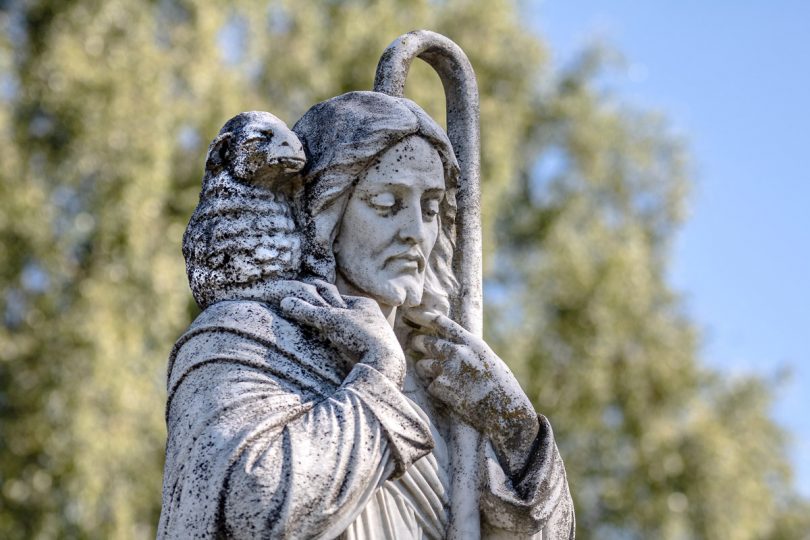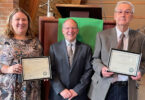Each week, Moravians across the U.S., Canada and the Caribbean share a common message through their Sunday bulletins. This month, we share insights written on John 10:1-18 for the Fourth Sunday of Easter. Thanks to writers past and present for their contributions, and to the Rev. Hermann Weinlick for his continued editing of our bulletin messages.
John 10:1-18 NRSV
10 “Very truly, I tell you, anyone who does not enter the sheepfold by the gate but climbs in by another way is a thief and a bandit. 2 The one who enters by the gate is the shepherd of the sheep. 3 The gatekeeper opens the gate for him, and the sheep hear his voice. He calls his own sheep by name and leads them out. 4 When he has brought out all his own, he goes ahead of them, and the sheep follow him because they know his voice. 5 They will not follow a stranger, but they will run from him because they do not know the voice of strangers.” 6 Jesus used this figure of speech with them, but they did not understand what he was saying to them.
7 So again Jesus said to them, “Very truly, I tell you, I am the gate for the sheep. 8 All who came before me are thieves and bandits; but the sheep did not listen to them. 9 I am the gate. Whoever enters by me will be saved, and will come in and go out and find pasture. 10 The thief comes only to steal and kill and destroy. I came that they may have life, and have it abundantly.
11 “I am the good shepherd. The good shepherd lays down his life for the sheep. 12 The hired hand, who is not the shepherd and does not own the sheep, sees the wolf coming and leaves the sheep and runs away—and the wolf snatches them and scatters them. 13 The hired hand runs away because a hired hand does not care for the sheep.
14 I am the good shepherd. I know my own and my own know me, 15 just as the Father knows me and I know the Father. And I lay down my life for the sheep. 16 I have other sheep that do not belong to this fold. I must bring them also, and they will listen to my voice. So there will be one flock, one shepherd. 17 For this reason the Father loves me, because I lay down my life in order to take it up again. 18 No one takes[a] it from me, but I lay it down of my own accord. I have power to lay it down, and I have power to take it up again. I have received this command from my Father.”
Shepherds
Donna Hurt, Home Moravian Church, Winston-Salem, N.C. • April 25, 2021
Jesus fulfills Old Testament promises from several of the prophets that God himself will come to shepherd His people. Isaiah 40:11 declares, “He will feed his flock like a shepherd,” and in Ezekiel 34:15 we read, “I myself will be the shepherd of my sheep, says the Lord.”
For Jesus to use the example of being a good shepherd makes sense, because that was one of the major occupations throughout Palestine in his day. His listeners knew about them. People that cared for flocks of sheep were of the lowest socioeconomic level, with little to no education. They had an important responsibility, however, of providing for and protecting sheep, sometimes sacrificially.
“The good shepherd lays down his life for the sheep” implies that this kind of shepherd stands ready to sacrifice his total self if need be. Three times in these eight verses we hear Jesus make this prophetic statement. It alludes, of course, to his sacrificing his own life for us as the means of our reconciliation to God.
In these days of 2021, my guess is that few of us know any individuals who actually work as a shepherd, but it’s quite likely that we do know people who give of themselves to shepherd others along the right path. This too requires providing what’s needed (direction, encouragement, friendship) plus offering protection if circumstances warrant. And yes, there could be some sacrifice involved, especially in the giving of personal time.
How willing are we to intentionally shepherd others toward a life of loving God and our neighbors, thereby helping to bring them into the fold so they can “listen to Jesus’ voice”? This is the voice of the one Good Shepherd, who “knows his own and his own know him.”
A Gift
Jodie L. Harney, pastor, Mountainview Moravian Church, Hellertown, Pa. • April 22, 2018
There are many different slogans, catch phrases, and songs that, once someone starts them, we can finish them. “My bologna has a first name—it’s…”; “There are some things that money can’t buy; for everything else there’s … “If you’re happy and you know it, clap ….”
Imagine how different our world could be if we were able to complete Scripture verses as easily as we complete advertising slogans. “The Lord is my shepherd; I shall not want.” “Just as you did it to one of the least of these, you did it to me.” “Those who exalt themselves will be humbled, and those who humble themselves will be exalted.”
Consider the beginning of today’s Gospel passage: “I am the good shepherd. The good shepherd lays down his life for the sheep” (John 10:11).
Take just a moment and think about these two short sentences. Jesus is saying to his disciples (both then and now) that he is the good shepherd. There’s no doubt, no question in his voice—just bold and clear, “I am the good shepherd.” And what does this good shepherd do for his sheep, his followers, his disciples? He lays down his life for them. He lays down his life—for you and for me.
What have you done to deserve such a meaningful gift? What have you done to be worthy of someone laying down their life for you? In all honesty, nothing. Christ died for you and for me. Christ died for us hundreds of years before any of us were born, and he dies for us because he loves us.
Most of the time we are not truly worthy of having a savior like this. Sure, we have moments when we do the right thing. But imagine a world where we always did the right thing. Imagine a world where women and men, boys and girls, could get along, could work together for the common good and could live in peace and harmony. Can you even imagine that?
My challenge for you today, tomorrow, and forever, is to live a life that is truly worthy of this unmerited, undeserved gift that our Lord and Savior has given to us.
The Good Shepherd
Suzanne P. Miller, associate pastor, Raleigh Moravian Church, Raleigh, N.C. • May 3, 2009
Unlike the situation in Jesus’ time, the image of a shepherd is not one that, I believe, we can easily relate to the world where we live, so that can make today’s lesson more challenging. Jesus sets himself apart by being the “good,” “noble,” or “model” shepherd. One aspect of being a good shepherd involves knowing one’s own flock (John 10:14).
This knowledge is crucial, because it helps keep the sheep safe from harm. By listening to their shepherd, sheep are able to stay away from danger. But the image goes deeper than that. The sheep are in relationship with the shepherd.
Jesus is modeling real relationships with his sheep. He is in relationship with God and also with his followers, and he serves as our example for authentic, real relationships.
Today’s world is often so busy that it is difficult to take the time needed to invest in real relationships, especially with people we have less in common with. How often are we able to stop and listen deeply when we ask, “How are you?” How often are we willing to talk with the person who is different from us, who might be considered an outsider? We have Jesus’ example of showing love through real relationships as our model, and it is up to us as the church to live out that example in our world.
This week let us be on the lookout for the outsiders in our community and those people who often get overlooked. Take the time to ask, “How are you doing?” Then listen to what they have to say. Jesus promises he knows our voice and we know his. As you show love through listening, do you hear the Shepherd’s voice speaking through other people? By listening and loving, relationships grow as we follow our good Shepherd.
The Good Shepherd
Percival S. Gordon, pastor, Redeemer Moravian Church, Philadelphia, Pa. • April 21, 2002
The preacher Jesus always used the concrete to talk about the abstract. Door, sheep and shepherd are familiar terms in most cultures around the world. In ancient Palestine, sheep played a major role in the economy. So when Jesus used these terms, his listeners knew what he was talking about.
Using the metaphors of door, sheep and shepherd, Jesus taught a lesson concerning himself. “I am the door of the sheep.” There were communal sheepfolds in Israel. In those shelters, the sheep were protected by a solid door. Only one person held the key. No one can enter the kingdom of God except through Jesus, the door.
In the Old Testament, the term shepherd is used to describe God as a caring person. Psalm 23 declares, “The Lord is my shepherd; I shall not want.”
“I am the good shepherd” implies that there are some bad shepherds. A bad shepherd, not concerned about the well-being of the sheep, exploits them. A bad shepherd comes to steal and rob the sheep. God does not take kindly to shepherds who exploit or abuse the sheep. In Ezekiel 34, God thunders against the kings of Israel as shepherds who feed on the sheep, instead of feeding the sheep. This was the kind of shepherd Jesus referred to as having preceded him.
The good shepherd, on the other hand, cares for the sheep. He as to follow the sheep through rugged terrain in search of food and protects the sheep from human and animal predators. Those of us who are shepherds know for sure how tough this job is. But Jesus has preceded us on this road.
Jesus laid down his life for the sheep, that they might keep theirs. Jesus came that sheep might have life. This is exciting news for all sheep and shepherds. Shepherds and sheep obedient to the Good Shepherd, Jesus Christ, will have the good life in abundance.







